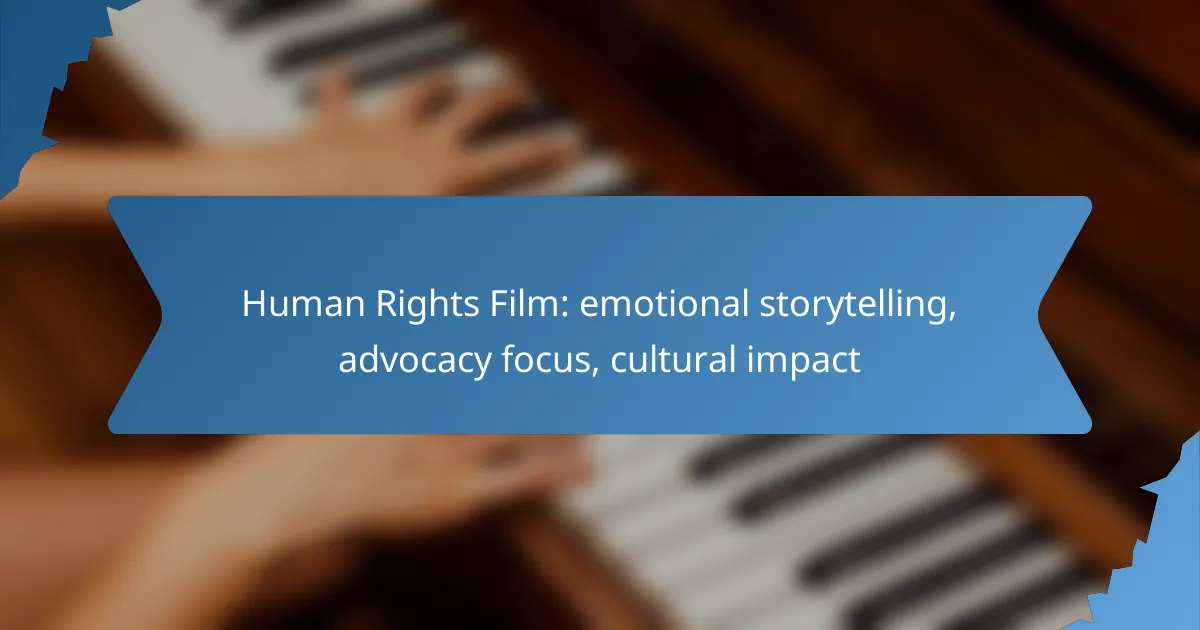Human rights films play a crucial role in fostering emotional storytelling that connects audiences to the personal experiences of those affected by injustices. By highlighting critical issues and promoting social change, these films evoke empathy and inspire advocacy, ultimately influencing cultural perceptions and societal values.
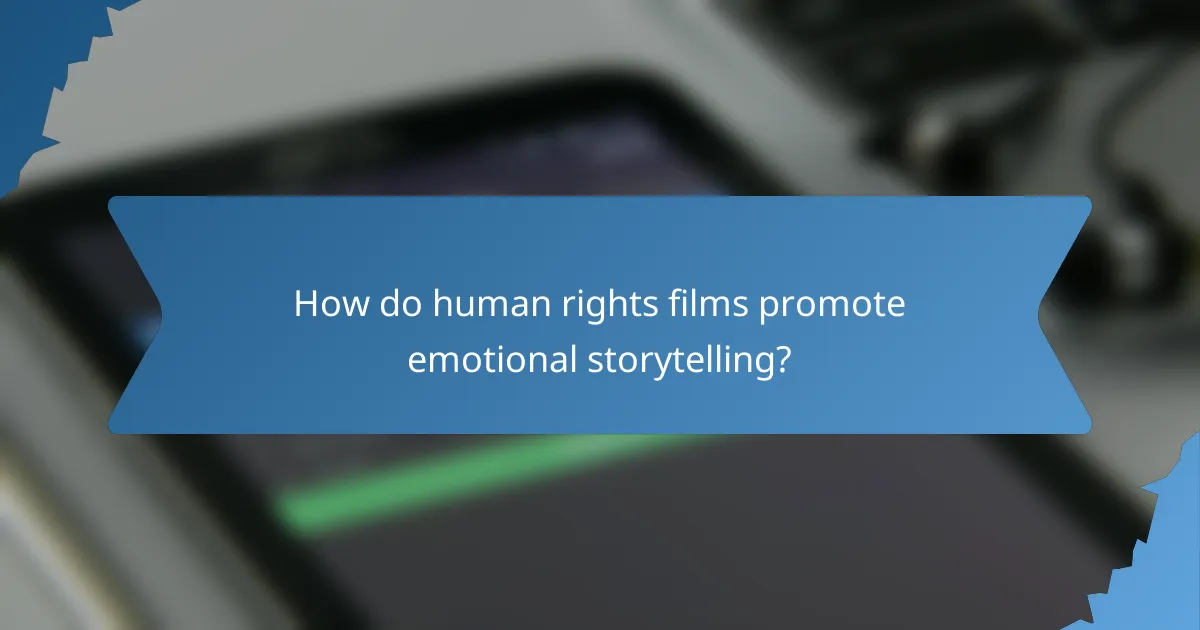
How do human rights films promote emotional storytelling?
Human rights films foster emotional storytelling by connecting audiences to the personal experiences of individuals affected by injustices. Through powerful narratives, these films evoke empathy and inspire advocacy, making complex issues relatable and urgent.
Personal narratives
Personal narratives are central to human rights films, as they provide intimate glimpses into the lives of individuals facing oppression. By sharing true stories, filmmakers can highlight the human experience behind statistics, making the issues more tangible for viewers. For instance, a documentary following a refugee’s journey can illustrate the struggles and resilience of those fleeing conflict.
These narratives often include interviews and firsthand accounts, allowing audiences to form emotional connections with the subjects. This connection can motivate viewers to engage in advocacy or support related causes.
Visual symbolism
Visual symbolism enhances emotional storytelling in human rights films by using imagery to convey deeper meanings. Symbolic visuals, such as a broken chain representing freedom or a candle signifying hope, can resonate powerfully with viewers. These images can evoke strong emotional responses, reinforcing the film’s message without the need for extensive dialogue.
Filmmakers often employ color palettes and visual metaphors to underscore themes of struggle and resilience. For example, dark tones may represent despair, while vibrant colors can signify hope and change, guiding the audience’s emotional journey throughout the film.
Character-driven plots
Character-driven plots are essential in human rights films, as they focus on the development and experiences of individuals rather than abstract concepts. By centering the narrative around relatable characters, filmmakers can create a compelling story that draws viewers in. This approach allows audiences to witness the impact of human rights violations on personal lives, making the issues more urgent and relatable.
Effective character arcs often involve transformation or growth, illustrating how individuals confront and overcome adversity. This not only captivates viewers but also encourages them to reflect on their own roles in advocating for human rights and social justice.
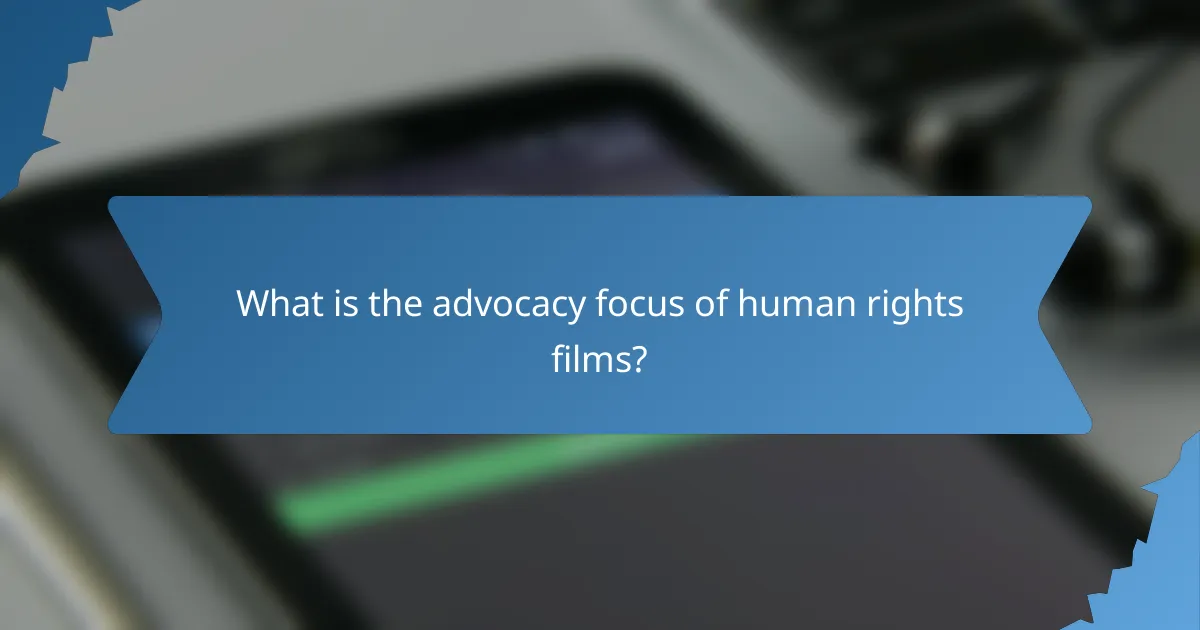
What is the advocacy focus of human rights films?
The advocacy focus of human rights films centers on highlighting injustices and promoting social change. These films aim to educate audiences about various human rights issues, encouraging empathy and action towards marginalized communities.
Raising awareness
Human rights films play a crucial role in raising awareness by bringing attention to issues that may be overlooked or misunderstood. Through powerful narratives and emotional storytelling, these films can evoke strong feelings and provoke thought among viewers.
For example, documentaries that depict the struggles of refugees or victims of discrimination can help audiences understand the complexities of these issues. By showcasing real-life stories, filmmakers can foster a deeper connection and understanding of the human experience behind the statistics.
Mobilizing communities
These films often serve as catalysts for community mobilization, inspiring viewers to take action. By presenting relatable stories, human rights films can galvanize local groups to organize events, protests, or awareness campaigns.
Community screenings can be particularly effective, as they create a shared space for discussion and collaboration. Engaging local leaders and activists in these events can further amplify the impact, encouraging collective efforts toward advocacy.
Influencing policy change
Human rights films can influence policy change by shedding light on systemic issues and advocating for reform. By documenting injustices and presenting compelling evidence, filmmakers can appeal to policymakers and stakeholders to address these concerns.
For instance, films that highlight police brutality or environmental degradation can lead to public outcry, prompting legislative action. Collaborating with NGOs and advocacy groups can enhance the film’s reach and effectiveness in driving policy discussions and reforms.
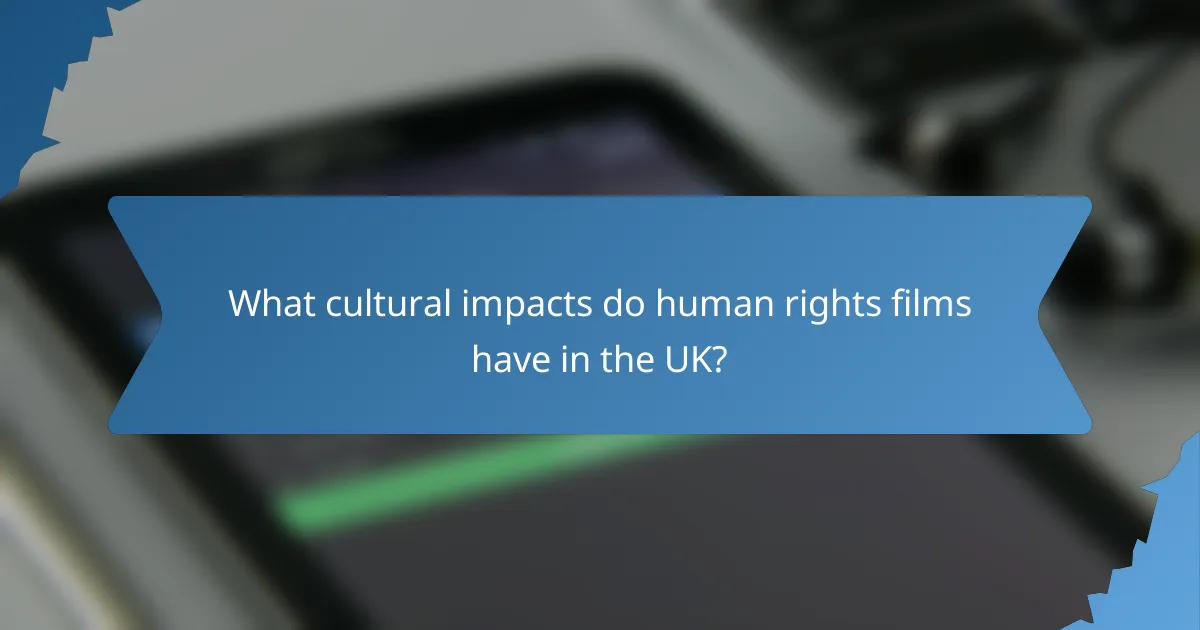
What cultural impacts do human rights films have in the UK?
Human rights films in the UK significantly influence cultural perceptions and societal values by raising awareness about critical issues. They serve as powerful tools for advocacy, encouraging audiences to engage with and reflect on human rights challenges both locally and globally.
Shaping public discourse
Human rights films play a crucial role in shaping public discourse by bringing attention to often-overlooked issues. They provide a platform for marginalized voices, prompting discussions in various forums, including social media, community events, and educational settings.
For instance, films that highlight the plight of refugees can lead to increased media coverage and public debates about immigration policies in the UK. This engagement can influence policymakers and encourage more informed public opinions.
Inspiring social movements
These films can ignite social movements by mobilizing individuals around a common cause. Documentaries and narratives that depict struggles for justice often resonate deeply, motivating viewers to take action, whether through protests, campaigns, or grassroots initiatives.
A notable example is the impact of films addressing climate change and environmental justice, which have spurred youth-led movements across the UK, urging government action and corporate accountability.
Fostering empathy
Human rights films foster empathy by allowing audiences to connect emotionally with the experiences of others. Through compelling storytelling, viewers gain insight into the lives of individuals facing human rights violations, which can challenge preconceived notions and biases.
By portraying personal stories of resilience and suffering, these films encourage viewers to reflect on their own values and responsibilities towards human rights, often leading to increased advocacy and support for related causes.
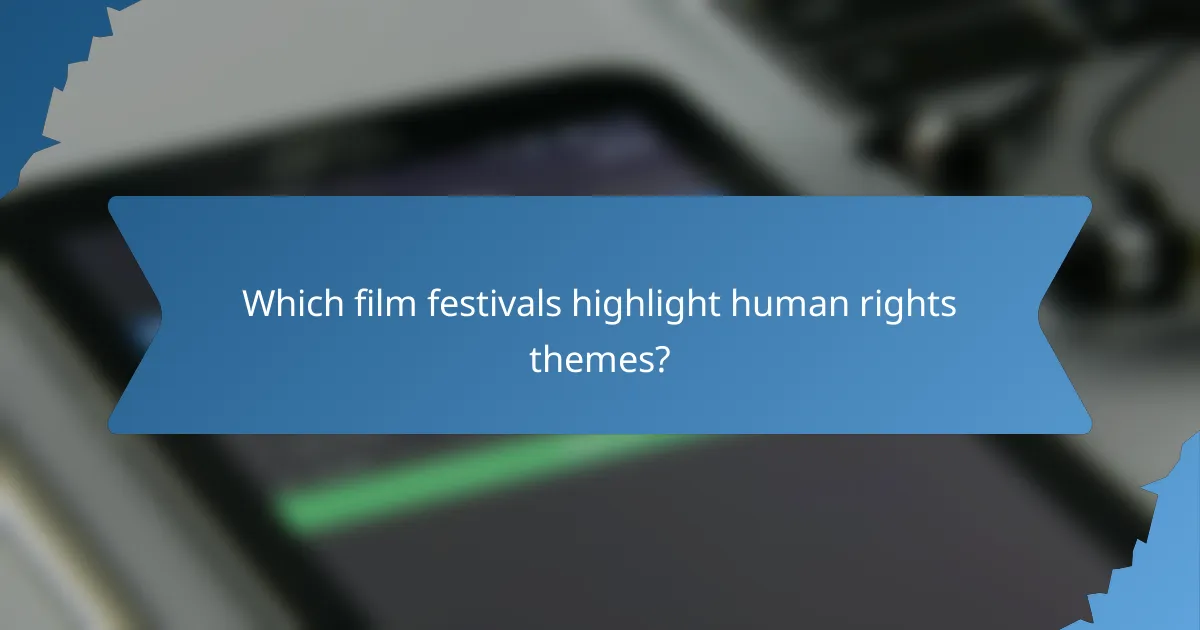
Which film festivals highlight human rights themes?
Several prominent film festivals focus on human rights themes, showcasing films that advocate for social justice and cultural awareness. These festivals provide a platform for filmmakers to present powerful narratives that inspire change and raise awareness about pressing human rights issues.
Human Rights Watch Film Festival
The Human Rights Watch Film Festival is a leading event that features documentaries and narrative films focusing on human rights abuses and advocacy. Held annually in various cities, including New York and London, it aims to educate audiences about global human rights issues through compelling storytelling.
This festival often includes panel discussions and Q&A sessions with filmmakers and activists, providing deeper insights into the issues presented in the films. Attendees can expect to engage with thought-provoking content that encourages activism and awareness.
Sheffield Doc/Fest
Sheffield Doc/Fest is one of the UK’s premier documentary festivals, showcasing films that address human rights themes among other social issues. The festival emphasizes the importance of documentary storytelling in raising awareness and fostering dialogue around critical topics.
With a diverse lineup of films, Sheffield Doc/Fest also features workshops and networking opportunities for filmmakers and activists. This festival is an excellent venue for discovering innovative approaches to human rights storytelling and connecting with like-minded individuals.
London Film Festival
The London Film Festival includes a range of films that explore human rights themes, often highlighting stories from marginalized communities. This festival attracts a global audience and showcases both established and emerging filmmakers, providing a platform for diverse voices.
In addition to screenings, the London Film Festival hosts discussions and events that encourage audience engagement with the themes presented. Attendees can gain valuable perspectives on the intersection of film and human rights, making it a significant event for advocates and film enthusiasts alike.
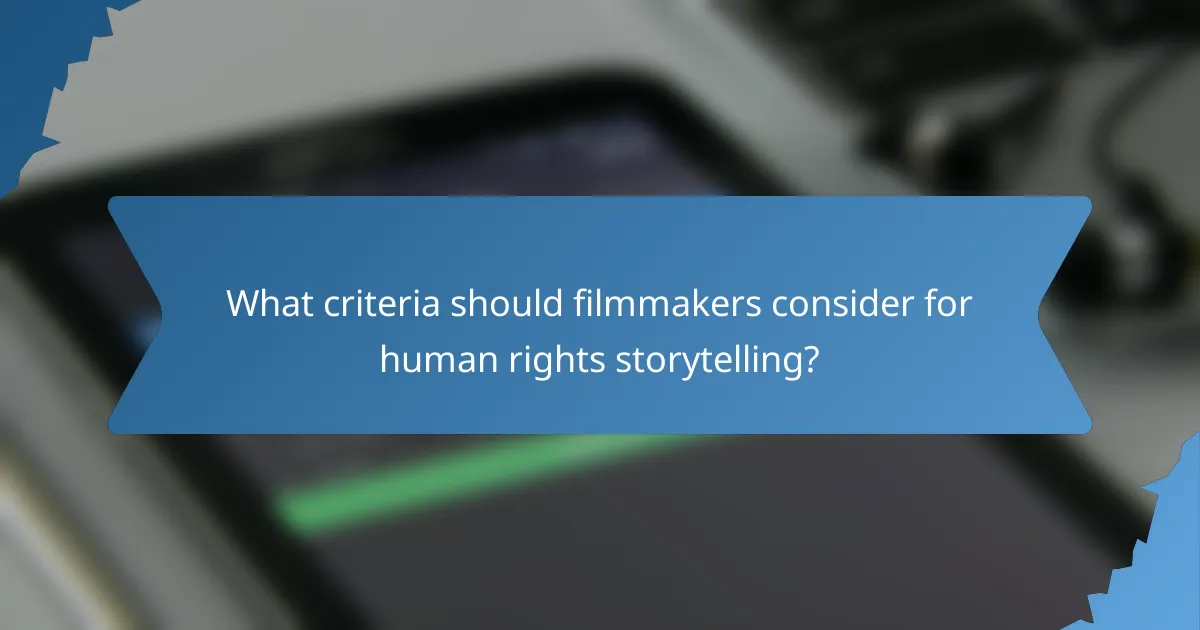
What criteria should filmmakers consider for human rights storytelling?
Filmmakers should prioritize authenticity, cultural sensitivity, and community engagement when creating human rights narratives. These criteria ensure that stories resonate deeply and foster genuine advocacy for the causes they represent.
Authenticity of representation
Authenticity in representation is crucial for human rights storytelling. Filmmakers must accurately depict the experiences and voices of marginalized communities to build trust and credibility. This involves thorough research and collaboration with individuals directly affected by the issues being portrayed.
Using real stories and firsthand accounts can enhance the emotional impact of the film. Filmmakers should avoid stereotypes and clichés, opting instead for nuanced portrayals that reflect the complexity of human experiences. Engaging with local cultural contexts also helps ensure that the representation is respectful and accurate.
Engagement with affected communities
Engaging with affected communities is essential for creating meaningful human rights films. Filmmakers should involve community members in the storytelling process, allowing them to share their narratives and perspectives. This collaboration fosters a sense of ownership and empowerment among those represented.
Filmmakers can conduct workshops or focus groups to gather insights and feedback from the community. This approach not only enriches the storytelling but also helps avoid potential pitfalls, such as misrepresentation or exploitation. Building relationships with local organizations can also provide valuable support and resources throughout the filmmaking process.
